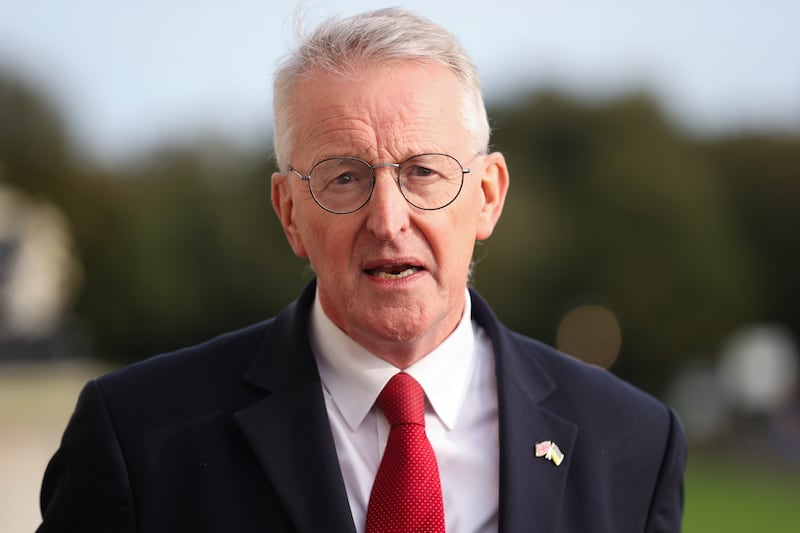Like it or not, and I suspect that for the overwhelming majority of you it’s ‘not’, we are hitched to the sinking ship of state known as the United Kingdom.
Thursday’s election gives the illusion we have some control over our destiny. But the voices we return to Westminster will struggle to be heard in a parliament focused almost entirely on the concerns of an English electorate.
When politicians use a word, they usually mean the opposite. “Change” is Keir Starmer’s cry. ‘More of the same’ is what we will get.
For the past 14 years, the British government has, at best, been indifferent to the needs of people here. That we have survived the incompetence of successive secretaries of state is one of the most remarkable things about our politics. But at what cost? Like the UK as a whole, the north has been brought to its knees.
With the exception of the short-lived Julian Smith, culled by Boris Johnson for displaying a vestige of competence, the list of Tory potentates demonstrates the depths to which the British political class has sunk.

It’s worth naming and shaming: Owen Paterson, Theresa Villiers, James Brokenshire, Karen Bradley, Brandon Lewis, Shailesh Vara, Christopher Heaton-Harris – each useless in their own way, and none worthy even of a footnote in the history books.
High office is a privilege, and the opportunity it gives to make the world a better place is priceless. Yet each of them left the north a lesser place than when they arrived – a view shared by nationalist and unionist alike.
In all likelihood Hilary Benn will be packing his overnight bag and heading to Belfast by the weekend. But he will struggle to have his voice heard around the cabinet table, such is the scale of the challenge facing the incoming government, and the marginalisation of Irish issues.

To make matters worse, he will be reporting to a prime minister who is, at heart, an English nationalist; a prime minister who repeatedly stressed his credentials for government by claiming to be an integral part of the British legal and security regime in Northern Ireland while director of public prosecutions.
I do not need to rehearse Britain’s discredited ‘ends justify the means’ approach to law and government here: the systematic abuse of human rights; the many deaths of innocent people at the hands of the state; and the efforts by successive governments to cover their own tracks.
If Starmer were a stick of rock, the word ‘establishment’ would run right through him.

There will be a temptation to get caught up in the euphoria of a count which promises many ‘Portillo’ moments. But that would be indulgent.
We must hope for the best, and I do, but we must also expect the worst from whatever government the British electorate throws up.
- I’ll not be making any apologies for not voting on Thursday - Jake O’KaneOpens in new window
- British general elections have nothing to do with us, so why do some parties pretend they do? - Brian FeeneyOpens in new window
- Politics has gone to hell in a handcart, so it’s time for a new voting system - Alex KaneOpens in new window
Throughout this election Starmer has promised little, and that is what he will deliver. He has accepted Tory economics and spending plans and aligned himself with the city; he apes the language of the right when talking about migration; he has set himself against revisiting Brexit (now recognised as a disaster even by those who voted for it); and he is opening the doors to greater private sector involvement in the health service.
If he looks like a Tory and talks like a Tory, there’s a good chance he is a Tory.
If Starmer looks like a Tory and talks like a Tory, there’s a good chance he is a Tory
As for the election here, I am not a fan of journalists advising people how to vote. In my experience, Irish News readers are well-informed enough to make up their own minds. But I strongly believe it is important for each of us to cast our ballot – even if it is to take the opportunity to write ‘none of the above’ across the ballot paper.
The count will produce two figures. The first is perhaps the least important – who gets the most votes in each constituency. The first past the post system is a blunt instrument, the outcome does not tell the full story. In any case, the Northern Ireland cohort in the next parliament will be a drop in a very polluted ocean.
The second figure, vote share, is of much greater consequence – not just for the individual parties, but for what it tells us about the broader shift in politics.
We have an opportunity on Thursday to reinforce the message that the electorate here rejects the type of unionism which longs for a return to the 1920s. We should take it.




